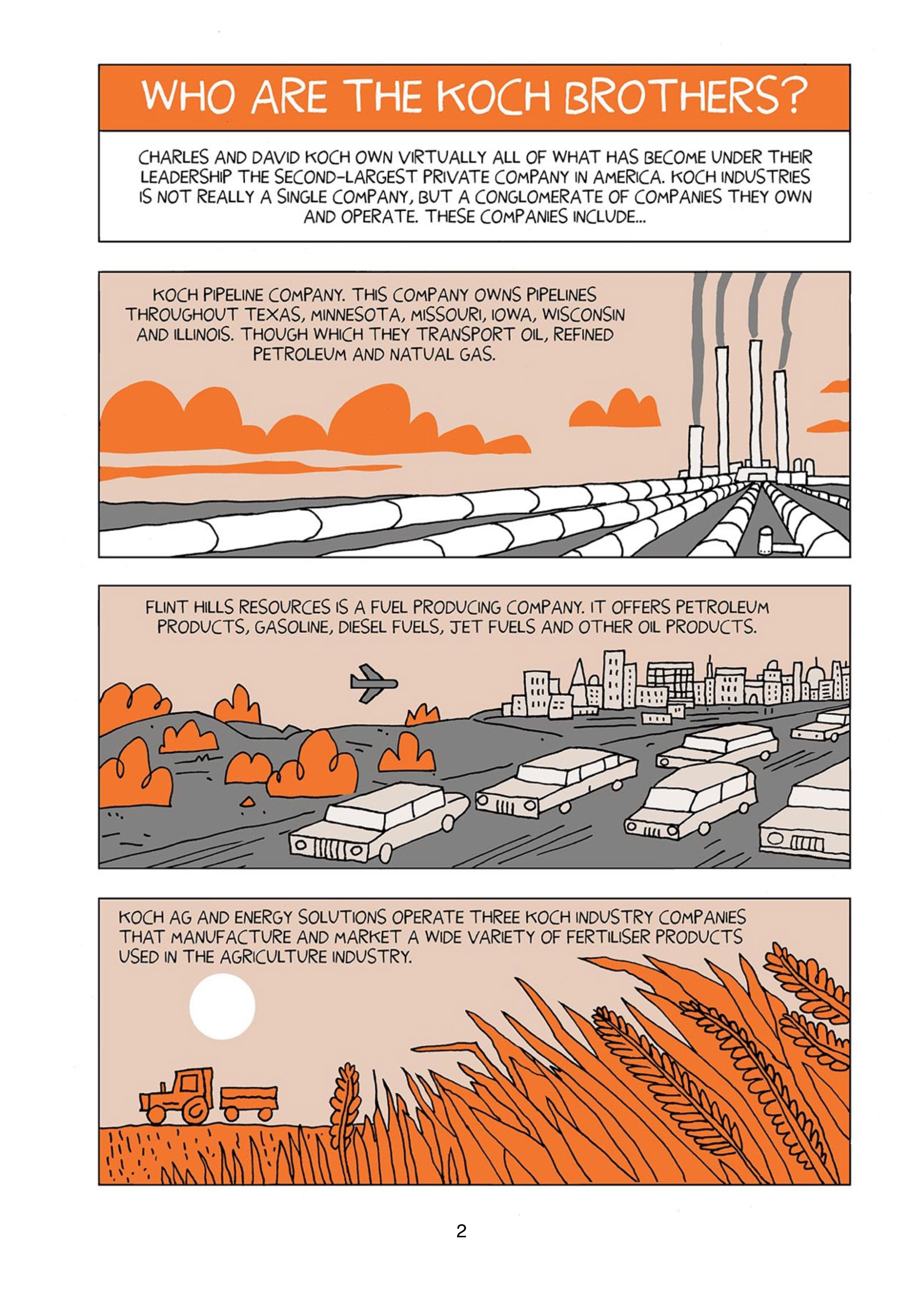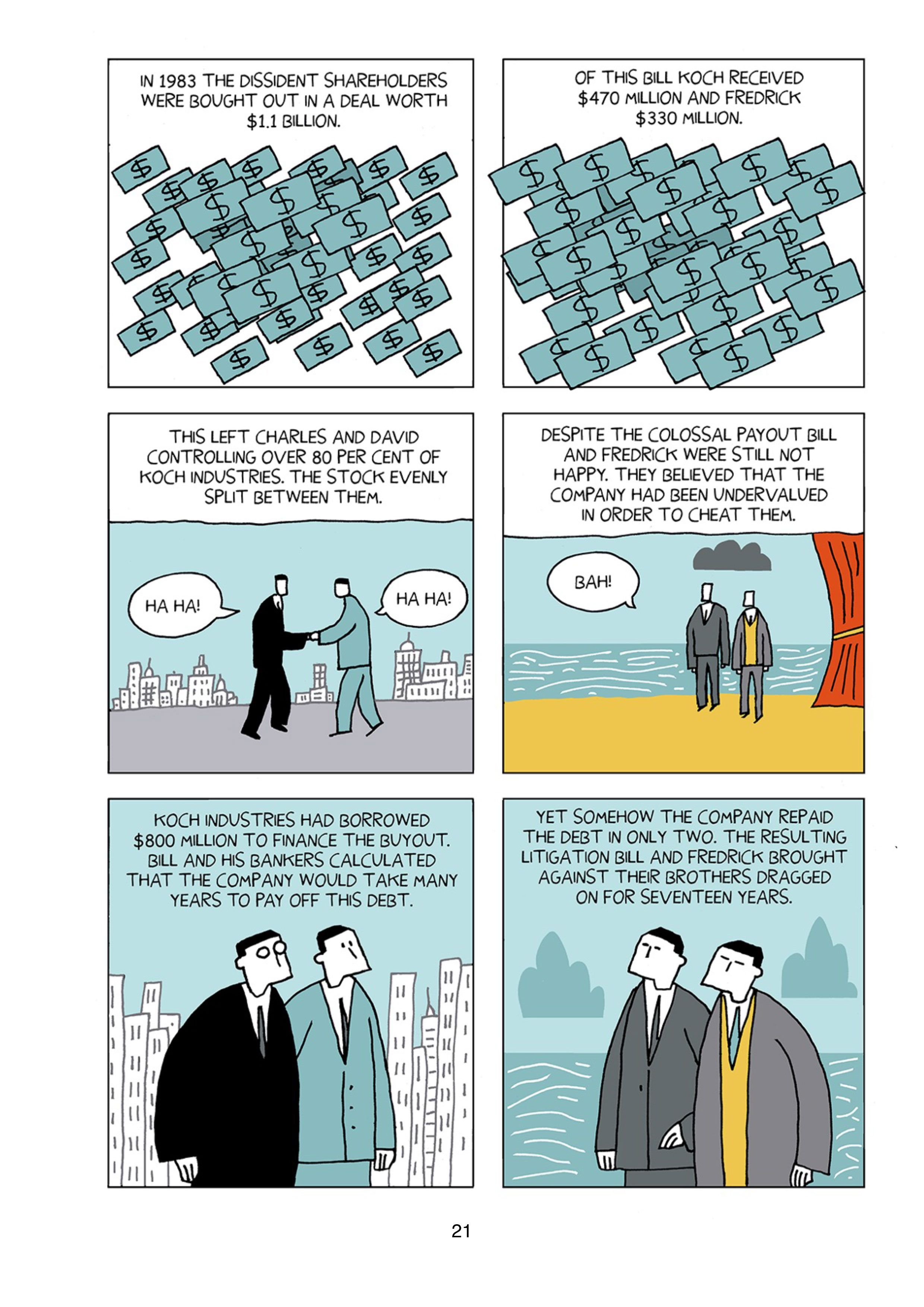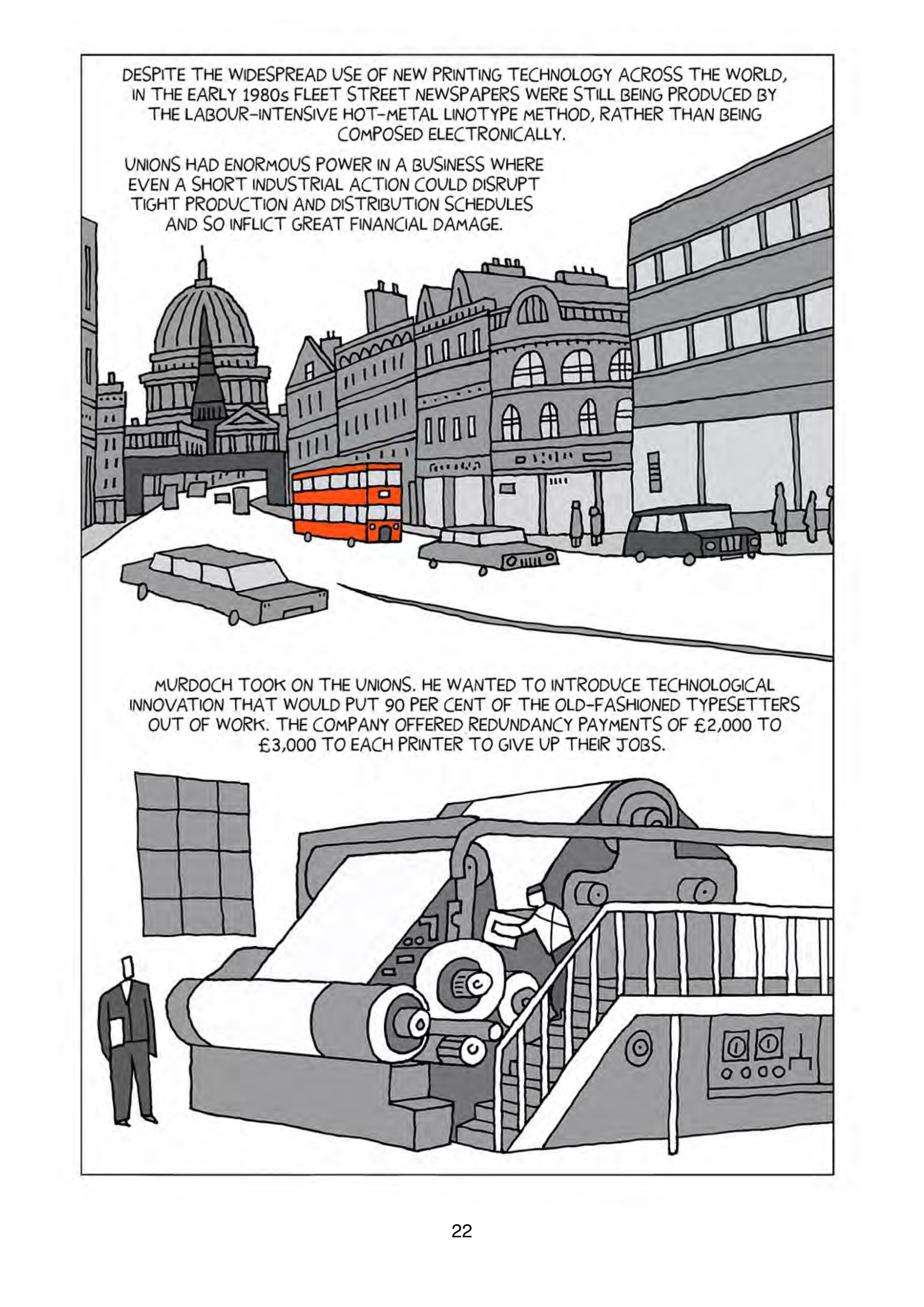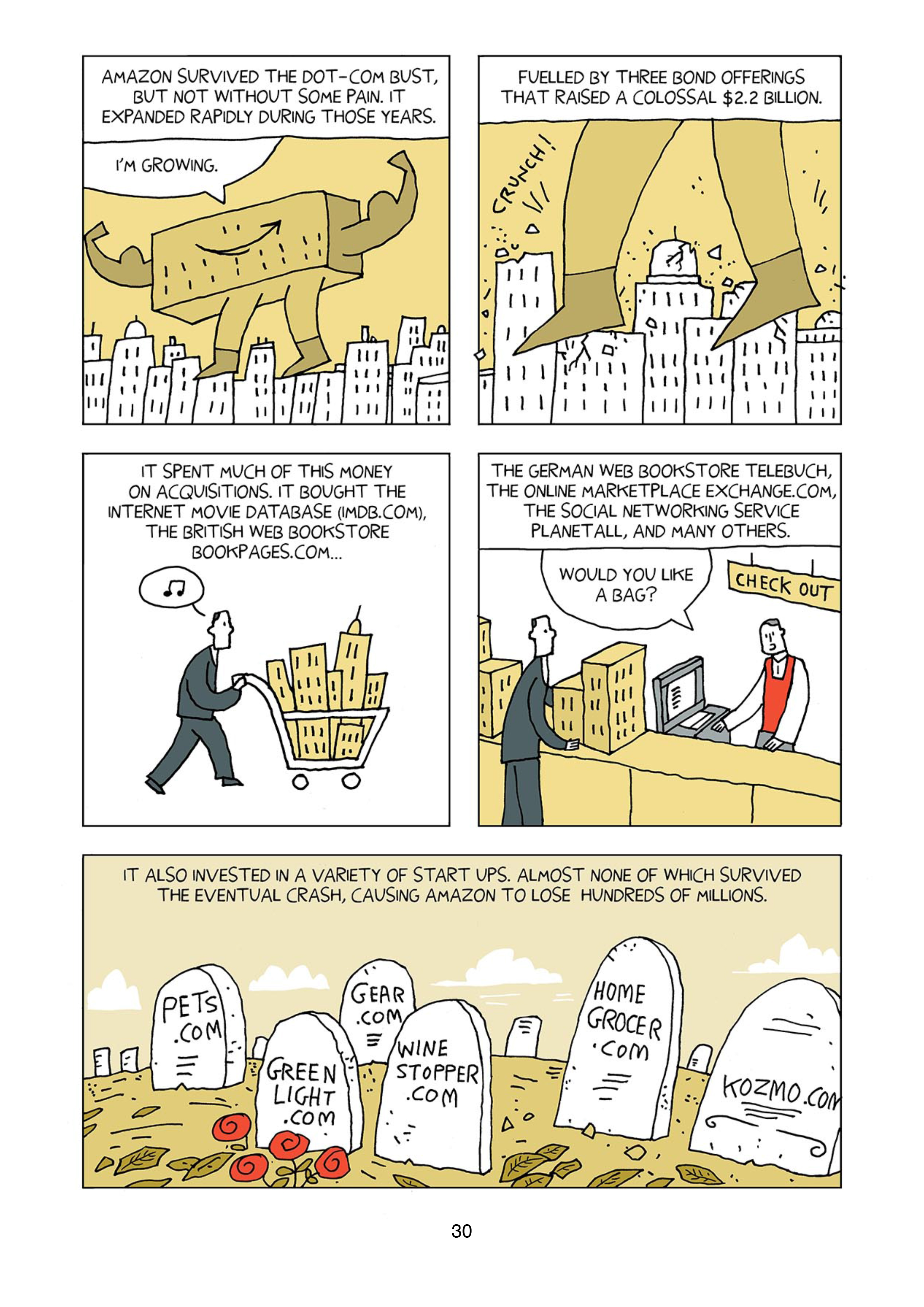Ever since Blank Slate first published his achingly honest Psychiatric Tales I have eagerly anticipated each new work by Darryl Cunningham, who has, with a mixture of detailed research, touches of humour, savvy observation and sensitivity, become for me one of our finest cartoonists working in non-fiction fields. Billionaires is a very timely publication: while there has been a division between the richer and poorer probably since the earliest civilisations, the disparity has grown enormously since the 1800s until we now have a tiny amount of people – the “one percent” as they are often referred to in the media – who have more wealth than most of the rest of the billions of people on the planet combined.
While the sheer levels of wealth and indulgence and the differential between those at the top and the rest of us may now be hugely exacerbated, Darryl points out right from the introduction that this is not new, drawing parallels to the “Gilded Age” of tycoons like Rockefeller and the Vanderbilts. This is not just an examination of the sheer accumulation of wealth, however, this is more about the effects of that level of wealth both on those who have it and on the wider society around them (which doesn’t have it), and again Darryl points out historical antecedents to our modern One Percent-influenced world, with those early tycoons and their use of wealth to garner power and influence that can be used to shape government policy and public opinion to service their own beliefs and their own, short-term corporate goals (the dismantling of environmental controls, for instance, or laws safeguarding worker’s rights).
For the purposes of the book Darryl has chosen to focus on three billionaires – Rupert Murdoch (media baron), the Koch Brothers (oil and gas) and Jeff Bezos (online services and technology). As he points out himself this means all of his subjects here are male and white, but as he comments, most billionaires are white and male, and while he could cover female billionaires or billionaires of colour (and he hints perhaps he may some day), given Western society has been disproportionately shaped by wealthy, white males, it made sense to focus on them here.
Elsewhere in the book Darryl also addresses the fact his choices here are all very right-wing in their political outlook, but notes that such is the influence given to these few super-rich individuals now that regardless of where they are on the political and moral spectrum (the two are often quite separate) the fact just a few people can hold such power over millions of others is worrying.
For each of the three main sections we follow each of the subjects, from early life and influences through to their current positions. In each case I must say that Darryl does his level best to be fair-handed, probably more so than many of us would have been in his place, and that is to his credit – this is no hatchet job, although, of course, it does cover many actions by these men that most of us would probably find morally reprehensible. But it also covers more positive aspects of their life stories – Charles and David Koch labouring on their father’s ranch as youngsters, to learn the value of hard work and self-sufficiency, their father trying to teach them a lesson and not allow them to grow up as what today we’d probably refer to as spoiled trust fund brats.
Or a young Bezos thriving despite a difficult start in life, with a wayward father, who was later replaced by an immigrant man who married his mother and who applied himself in the American Dream style to better himself and his family (and did), along the way encouraging the young Jeff, or showing that the self-capable Bezos starting Amazon in his garage, building office desks himself by woodworking some old doors into work tables. There are even some surprising revelations (well, at least to me!), such as young Murdoch arriving in the UK to study for his degree and becoming so attracted to left-wing politics his rich father was worried about him.
While the early life lessons that formed these men may differ in subject and time and place, there does seem to be a common theme, which is a slow but relentless push by all of them to accrue more power, and the more they have, the more they want. The wealth itself seems almost secondary in some ways, to the power and influence they allow them, be it being able to command the lives of thousands of employees as they wish (Bezos and his demand that everyone in the company works as many hours as him and to hell with family life and the like, for instance), to being able to directly influence the levers of governmental power (and indeed to do so on an international, not just national scale), be it the Koch’s use of vast funding to power so-called Think Tanks and policy groups or college programmes to create “research” that backs their own views, or Murdoch and his “king-maker” model, where his media empire could make or break a political leader, making even Prime Ministers dance to his tune rather than serving their electorate or the national interests (one telling scene with very contemporary overtones notes that Murdoch loathes the EU because in the UK he can lift the phone and tell the PM what to do, but in Europe they don’t care who he is).
The artwork is in Darryl’s familiar, cartoony style (down to the free-drawn lines of buildings, no rulers here!), which is a style I have to say I have tremendous affection for. It is also a style that serves Darryl’s work well – it is clear, concise but very easy on the eye, helping to render the mountains of research and complex details into very simple to understand, accessible graphics. He makes it look very simple, and I am sure it is anything but. The art also leavens the heavyweight subject matter with some welcome touches of humour here and there (a page on young Jeff Bezos on his grandfather’s ranch, learning hands-on skills, including how to castrate bulls, has a cartoon bull staring at the reader and asking in alarm “What?!?!”).
As someone who has read all of Darryl’s works, right back to when he was creating his humour strip on the now-vanished Forbidden Planet Blog years ago, I found Billionaires especially interesting. Not just because it is a fascinating subject and an erudite, accessible examination of these people who have far too much influence over their fellow citizens, not to mention very contemporary (we see laws and even entire government policies changed to suit a few billionaires, not the electorate), but because it ties in very nicely to much of Darryl’s earlier works. Taking in the lives of these billionaires also covers economies (which Darryl has covered before, most notably in Supercrash) and the environment, which has featured in his science books. While they may not be designed as a connected series, for those of us who have read his previous works, it’s interesting and gratifying to notice many connections to elements of those earlier books.
As with all of Darryl’s works, Billionaires takes some very important and complex subjects – many of them matters which directly impact on the lives of ourselves and millions of others around the world – and distils all of that huge amount of research into a clear, thoughtful narrative that delivers detail without overloading the reader, and does so in a hugely compelling and fascinating manner. At this rate I think Darryl Cunningham may be becoming the UK’s equivalent to the great Larry Gonick, and our vibrant comics scene is all the richer for his work. Hugely recommended reading.










